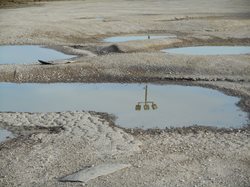As a candidate for FMCSA Chief, I feel it is necessary to weigh in on the 91,000 pounds issue. My  Congressman Reid Ribble proposed it. He should have asked me first. There are definite benefits to the idea. Shippers support it. For the shippers who scale out, it will cut shipping expenses. Currently they can load a dry van trailer to about 45,000 pounds. They could now load 56,000 pounds. A shipper who ships 5,000,000 pounds per day would now need 112 trucks per day. With this legislation they would only need 90 trucks. Temperature controlled and platform carriers could see similar numbers.
Congressman Reid Ribble proposed it. He should have asked me first. There are definite benefits to the idea. Shippers support it. For the shippers who scale out, it will cut shipping expenses. Currently they can load a dry van trailer to about 45,000 pounds. They could now load 56,000 pounds. A shipper who ships 5,000,000 pounds per day would now need 112 trucks per day. With this legislation they would only need 90 trucks. Temperature controlled and platform carriers could see similar numbers.
On the surface this is a good thing. It would increase overall efficiency. As a whole we would use less fuel to move the same freight volume. It would take some market share from the railroad industry. Ribble doesn't see more infrastructure wear and tear. (I would suggest a trip through the Detroit area, where the Michigan Special heavier multiple axle trucks roam. Drive something with good ground clearance, you're gonna need it.) The additional axle would distribute the weight. There would not be a significant change in axle weight. It is not “dumb on every level” as OOIDA's Todd Spencer says, but it is bad for truckers.
Shipping costs are a small fraction of the price of goods to market. Consumer savings would be small if any. Trucking companies that think that this will increase rates are living in a dream world. Costs  matter. Supply and demand set the rates. The weight increase would be an increase in supply with no corresponding increase in demand. Saving a penny on a 12 pack would probably not increase the overall demand for beer. An increase in supply with no increase in demand means lower rates.
matter. Supply and demand set the rates. The weight increase would be an increase in supply with no corresponding increase in demand. Saving a penny on a 12 pack would probably not increase the overall demand for beer. An increase in supply with no increase in demand means lower rates.
As FMCSA Chief – when I see a new proposal, I will always ask “Will this cause more accidents?” Physics tells us the heavier an object is, the longer it will take to stop. Driver wages are a concern. We need well rested drivers. The lower the per unit rate is, the more units each driver will have to produce to earn the same wages. Drivers need rest. It can be hard to find a safe place to rest. Added weight (and damaged lots) will discourage truck parking.
Adding an extra axle would increase the amount of stress to the trailer axles and the parking lots because of the number of reverse pivots the extra axle placement would cause. Some of my customers have holes deep enough to fish in now. Maybe I could make up for the expected decrease in weight by starting a fish stocking business. One of the lots that I visited was littered with mudflaps. One of the holes had 6 of them laying there. Perhaps, I could set up a mudflap replacement business. We will all have to find a way to make up for the lost income.